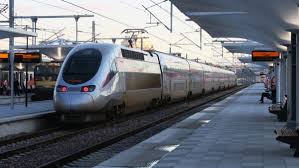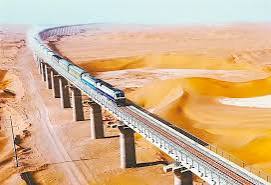Updated January 5, 2026:
The construction of the Sahara railway in Algeria, known as the Western Mining Railway has been completed. The project has achieved a monumental achievement as full-track installation has been completed. The project, jointly constructed by China Railway Construction Corporation (CRCC) and Algerian state-owned partners. Furthermore, it is the largest single infrastructure build by a Chinese firm in Algeria.
It stands as a commitment to economic cooperation under the Belt and Road initiative. The project’s delivery comes three months ahead of schedule, however, not without its struggles. Construction crews worked for more than 24 months under harsh desert conditions. Moreover, they overcame extreme heat, shifting sands and limited water supplies. As Africa’s first heavy-haul desert railway, it will handle 32.5-tonne axle-load freight trains. It will also handle passenger services of up to 160 kilometers per hour. The completion of the railway is the first of many down the line such as the Trans-desert railway, a 2400-kilometer rail project. Algeria has also officially inaugurated a 950-kilometer railway expected to tap the vast Gara Djebilet iron ore deposits in Algeria.

Impact of the Algeria Sahara Railway Project in the Region
The Algeria Sahara railway project is expected to have a monumental impact in various aspects. First is economically as it will facilitate transportation of goods across the desert region. Next is in accessibility and mobility as people will use the rail system for transport. It also features more than 580 kilometers of laid and welded rail and introduced Algeria’s first CPG500 track-laying machine and automated welding technology, significantly boosting efficiency. The Western Mining Railway is central to Algeria’s strategy to unlock the vast Gara Djebilet iron ore deposit in the southwest.
Experts estimate the railway could carry 20 million tonnes of iron ore annually, strengthening Algeria’s steel industry and export potential. A key engineering achievement was the completion of the 6-kilometer PK330 heavy-haul bridge in Tindouf Province, the longest of its kind in Africa. The rail will undoubtedly become a blueprint for heavy-haul desert rail infrastructure across Africa.
April 4, 2024:
The China Railway Construction Corporation (CRCC) has embarked on an ambitious endeavor to construct a 575km Sahara railway spanning the vast expanse of the Sahara desert, linking the Algerian iron ore mine at Gara Djebilet to the Moroccan rail network, as disclosed by the South China Morning Post. This significant project involves CRCC partnering, with Cosider Travaux Publics, a government owned civil engineering organization to achieve the goals of the initiative.
Location
The railway starts its journey, at Gara Djebilet mine. Extends to the Dumiat Industrial Zone in the Béchar region near the border. It is designed to be a transportation route with 40 placed stations to improve the provinces overall transport network. Gara Djebilet, operational since July 2022 is known for hosting one of the worlds deposits of high quality ore. Initial estimates suggest a production of around 3 million tons with forecasts predicting an increase, to 50 million tons.
Completion date
Beyond completion of 575km Sahara railway in 2026, China has pledged its commitment to undertaking ore extraction activities and erecting requisite facilities for research, enrichment, and de-phosphorization processes. Presently, China’s ore procurement heavily relies on imports primarily sourced from Australia (79%) and Brazil (19%), a necessity fueled by the nation’s status as the leading producer, commanding a staggering 52% share of the global steel output, amounting to an estimated 1 billion tonnes.Given the escalating tensions and strained economic and diplomatic relations between Beijing and Canberra, the initiation of this railway project serves as a strategic maneuver aimed at mitigating the inherent geopolitical risks associated with overdependence on ore imports from select countries.

The government of Algeria intends to use its mineral resources to amplify the development of other economic and to increase dependence on the oil and gas industries. This is now the case for the sector of non-oil industries which represent 19% of the country’s GDP and account for 93% of its export revenues. Through tapping and utilizing mineral resources, Algeria tries to build up permanent economic and social ground, and increase the ‘GSD’ level, too.
The South China Morning Post underscores CRCC’s proven track record and expertise in operating within the harsh and unforgiving terrains of the Sahara desert, evidenced by its prior involvement in the construction of segments of Algeria’s extensive 1,216-kilometer East-West Highway.Moreover, this ambitious undertaking serves to further cement the enduring and multifaceted relationship between China and Algeria, rooted in a shared history dating back to Algeria’s arduous struggle for independence against French colonial rule in the 1950s and 1960s.
Economic Impact
In a testament to the burgeoning ties between the two nations, the previous year witnessed the signing of 19 bilateral cooperation agreements amounting to a staggering $36 billion. These agreements encompass diverse sectors ranging from infrastructure development to telecommunications, with a significant emphasis on the construction of approximately 6,000 kilometers of railway networks. The initiation of this railway project highlights not only CRCC’s impressive engineering skills but also demonstrates China’s steadfast dedication to enhancing economic collaboration and promoting shared prosperity with its Algerian partners.
Read also Connecting Europe: The European-Gauge Railway Lays Down its First Tracks as Construction Commences
Read also Construction of 1st section of Bechar-Tindouf railway corridor in Algeria set to begin
